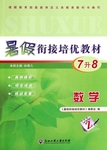
_________ that he learned some Chinese as a child.
| A.He is believing | B.He is believed | C.It believes | D.It is believed |
 新课标快乐提优暑假作业陕西旅游出版社系列答案
新课标快乐提优暑假作业陕西旅游出版社系列答案 暑假衔接培优教材浙江工商大学出版社系列答案
暑假衔接培优教材浙江工商大学出版社系列答案 欣语文化快乐暑假沈阳出版社系列答案
欣语文化快乐暑假沈阳出版社系列答案科目:高中英语 来源:英语教研室 题型:050
Often a prize is awarded to just one person, but not always. Sometimes a prize is shared. It may be awarded to two or more people who have worked together to reach a goal. Since the Nobel Prizes are international prizes, scientists, inventors, writers, and diplomats from all countries may receive a prize. Sometimes, two people from countries with different political views may even share a prize. An example of this is the 1973 Peace Prize, which was awarded to Henry Kissinger of the United States and to Le Due Tho of North Vietnam for the Vietnam peace negotiations. It is also sometimes true that a prize is not given. If there is not outstanding achievement in one of the five areas, no prize is given in that area. In 1972, for example, no Nobel peace prize was given.
Someone must decide whether or not to give an award. The process of nominating and choosing Nobel Prize winners have two parts. First, nominations, or recommendations, of people who might deserve a Nobel Prize, are made. The nominations in physics and chemistry are made by the Royal Academy of Science in Stockholm. The nominations in medicine or physiology are made by the Caroline Medical Institute, which is also in Stockholm. The Swedish Academy, along with the French and Spanish Academies, makes nominations in literature. The peace prize nominations are made by a committee of the Norwegian government. Many nominations are made in each area. Nominations from these groups begin the process of choosing the Nobel Prize winners.
The second part of the process of choosing Nobel Prize winners is to decide which of the nominees deserves the award in each area. This decision is made by the Nobel Foundation in Stockholm. The Foundation may decide to give the awards to an individual or to several people in each area. Or the Foundation may decide not to give a prize at all in any area.
1. A Nobel Prize is given in the form of ________.
A. a large sum of money
B. a diploma and a gold medal
C. a large amount of money together with a gold medal and a diploma
D. a prize certificate
2. The 1973 Peace Prize was awarded to ________.
A. two persons B. Henry Kissinger
C. Le Due Tho D. two individuals from different countries
3. Sometimes no prize is awarded when ________.
A. there is no remarkable achievement in that area
B. there is no suitable nomination
C. there is a war
D. there is financial shortage
4. The decision of literature prize winner is made by ________.
A. the Swedish Academy and the French and Spanish Academies
B. the Nobel Foundation
C. a committee for the Norwegian government
D. the Royal Academy of Science in Stockholm
查看答案和解析>>
科目:高中英语 来源:英语教研室 题型:050
The Nobel Prizes
The prizes are awarded by the Nobel Foundation(基金会)for outstanding achievements or contributions in these areas: chemistry, physics, medicine or physiology, literature and peace. Each prize has three parts. The first part is a gold medal. Second, a winner of a Nobel Prize is given a diploma(证书)saying that he has been awarded the prize. The third part of the prize is a large amount of money. Often a prize is awarded to just one person, but not always. Sometimes a prize is shared, maybe by two or more people who have worked together to reach a goal. Since the Nobel Prizes are international prizes, scientists, inventors, writers, and diplomats(外交官)from all countries may receive a prize. Sometimes, two people from countries with different political views may even share a prize. An example of this is the 1973 Peace Prize, which was awarded to Henry Kissinger of the United States and to Le Due Tho of North Vietnam for the Vietnam(越南)peace negotiations(谈判).It is also sometimes true that a prize is not given. If there is no outstanding achievement in one of these areas, no prize is given in that area. In 1972, for example, no Nobel Peace Prize was given. Someone must decide whether or not to give an award. The process of nominating(提名,推荐)and choosing Nobel Prize winners has two parts. First, nominations, or recommendations of people who might deserve(应得)a Nobel Prize, are made. The nominations in physics and chemistry are made by the Royal Academy(研究员,学会)of Science in Stockholm. The nominations in medicine or physiology are made by the Caroline Medical Institute, which is also in Stockholm. The Swedish Academy, along with the French and Spanish Academies, makes nominations in literature. The peace prize nominations are made by a committee of the Norwegian government. Many nominations are made in each area. Nominations from these groups begin the process of choosing the Nobel Prize winners.
The second part of the process of choosing Nobel Prize winners is to decide which of the nominees deserves the award in each area. This decision is made by the Nobel Foundation in Stockholm. The Foundation may decide not to give a prize at all in any area.
1.A Nobel Prize is given in the form of _____________.
A. a large quantity of money B.a diploma
C.a gold medal D.all of the above
2.The 1973 Peace Prize was awarded to _____________.
A.Henry Kissinger B.Le Duo Tho
C.two persons from one country D.two individuals from different countries
3.Sometimes a prize is not given because there is _____________.
A.no remarkable achievement in that area
B.no suitable nomination
C.disagreement among committee members
D.financial(经济的)shortage
4.The decision of literature prize winner is made by_____________.
A.the Swedish Academy and the French and Spanish Academies
B.the Nobel Foundation
C.a committee for the Norwegian government
D.the Royal Academy of Science in Stockholm
5.We can infer from this passage that_____________.
A.the Nobel Prize is given in six areas
B.the Nobel prizewinners are very carefully chosen
C.sometimes the Nobel Prize is not given
D.the Nobel Prize is international
查看答案和解析>>
科目:高中英语 来源: 题型:051
阅读理解
The Nobel Prizes
The prizes are awarded by the Nobel Foundation(基金会)for outstanding achievements or contributions in these areas: chemistry, physics, medicine or physiology, literature and peace. Each prize has three parts. The first part is a gold medal. Second, a winner of a Nobel Prize is given a diploma(证书)saying that he has been awarded the prize. The third part of the prize is a large amount of money. Often a prize is awarded to just one person, but not always. Sometimes a prize is shared, maybe by two or more people who have worked together to reach a goal. Since the Nobel Prizes are international prizes, scientists, inventors, writers, and diplomats(外交官)from all countries may receive a prize. Sometimes, two people from countries with different political views may even share a prize. An example of this is the 1973 Peace Prize, which was awarded to Henry Kissinger of the United States and to Le Due Tho of North Vietnam for the Vietnam(越南)peace negotiations(谈判).It is also sometimes true that a prize is not given. If there is no outstanding achievement in one of these areas, no prize is given in that area. In 1972, for example, no Nobel Peace Prize was given. Someone must decide whether or not to give an award. The process of nominating(提名,推荐)and choosing Nobel Prize winners has two parts. First, nominations, or recommendations of people who might deserve(应得)a Nobel Prize, are made. The nominations in physics and chemistry are made by the Royal Academy(研究员,学会)of Science in Stockholm. The nominations in medicine or physiology are made by the Caroline Medical Institute, which is also in Stockholm. The Swedish Academy, along with the French and Spanish Academies, makes nominations in literature. The peace prize nominations are made by a committee of the Norwegian government. Many nominations are made in each area. Nominations from these groups begin the process of choosing the Nobel Prize winners.
The second part of the process of choosing Nobel Prize winners is to decide which of the nominees deserves the award in each area. This decision is made by the Nobel Foundation in Stockholm. The Foundation may decide not to give a prize at all in any area.
1.A Nobel Prize is given in the form of _____________.
A. a large quantity of money B.a diploma
C.a gold medal D.all of the above
2.The 1973 Peace Prize was awarded to _____________.
A.Henry Kissinger B.Le Duo Tho
C.two persons from one country D.two individuals from different countries
3.Sometimes a prize is not given because there is _____________.
A.no remarkable achievement in that area
B.no suitable nomination
C.disagreement among committee members
D.financial(经济的)shortage
4.The decision of literature prize winner is made by_____________.
A.the Swedish Academy and the French and Spanish Academies
B.the Nobel Foundation
C.a committee for the Norwegian government
D.the Royal Academy of Science in Stockholm
5.We can infer from this passage that_____________.
A.the Nobel Prize is given in six areas
B.the Nobel prizewinners are very carefully chosen
C.sometimes the Nobel Prize is not given
D.the Nobel Prize is international
查看答案和解析>>
科目:高中英语 来源:浙江省宁波市八校2011-2012学年高二下学期期末联考英语试题 题型:050
| |||||||||||||||||||||||||||||||||||||||||||||||||||||||||||
查看答案和解析>>
科目:高中英语 来源: 题型:阅读理解
Before Nicolas Sarkozy became French president, he was asked if he thought about presidency when he looked in the mirror while shaving. “Not just when I’ m shaving,” he answered.
When Francois Hollande, now president-elect (总统当选人) of France, was asked the same question, he replied: “Do I see myself as president? No, I am a presidential candidate. A candidate must not think himself president; he must give hope that he becomes president.”
Hollande has promised to be a “normal president” – something Sarkozy certainly was not. Sarkozy celebrated his election in 2007 at a world-class Parisian restaurant. He took holidays on the yachts (游艇) of wealthy businesspeople. Hollande, by contrast, was still going around Paris on his three-wheeled motorbike at the start of this year. One member of his party said he looked “more like a pizza delivery man” than the next president.
“That is the key to Hollande’s success because the election is turning into a sort of referendum (公民投票) for or against Nicolas Sarkozy,” Eric Dupin, a journalist and political observer told Global Post. “Francois Hollande is the one who appears not only as his main opponent politically, but also as his complete opposite psychologically.”
When he was the Socialist party leader, Hollande was nicknamed “the marshmallow (软糖)” because he hated fights. Sarkozy, by contrast, is known to be loud and aggressive.
When faced with Sarkozy’s verbal attacks during the election, Hollande stayed calm. This sometimes annoyed even his own supporters. “I wish he would just let go and savage (用暴力对付) Sarko,” one Hollande voter said to the Guardian.
But Hollande still knows how to fight. Stéphane Le Foll, a Socialist MEP who has been one of Hollande’s closest advisors for 17 years and is co-directing his campaign, said Hollande had quietly planned his presidential bid for 10 years. “I think we all underestimated this guy,” Alain Minc, one of Sarkozy’s closest friends and advisers, told Reuters.
Hollande was born in 1954 into a middle-class family. He lived through the 1968 protests that nearly overthrew the French government. “They shocked him, but also politicized him, he said in a recent interview, making him understand that change was possible,” reported the New York Times. When Hollande was 15, he told friends he expected to become president.
“I didn’t come to the first rank either by chance or by obsession (执迷),” Hollande said in an interview with Reuters. “I got there because I put myself in this situation, and because I deserved it.”
68. By citing Hollande and Sarkozy’s replies to the same question, the author intends to show ________.
A. Sarkozy is more confident than Hollande
B. Hollande is more modest than Sarkozy
C. Hollande is less ambitious than Sarkozy
D. Sarkozy is more humorous than Hollande
69. What is the key to Hollande’s success in the presidential election according to Eric Dupin?
A. His dislike of fights.
B. His careful plan for the presidential bid.
C. How different he is from Sarkozy.
D. The gentle way in which he ran his campaign.
70. What did Hollande think he owed his success to, according to the article?
A. His good luck. B. His devotion and efforts.
C. His obsession with politics. D. His personality and experience.
71. What is the purpose of the article?
A. To show what kind of a person Hollande is.
B. To compare the differences between Hollande and Sarkozy.
C. To show what French people think of Hollande.
D. To explain why Sarkozy lost the election.
查看答案和解析>>
湖北省互联网违法和不良信息举报平台 | 网上有害信息举报专区 | 电信诈骗举报专区 | 涉历史虚无主义有害信息举报专区 | 涉企侵权举报专区
违法和不良信息举报电话:027-86699610 举报邮箱:58377363@163.com